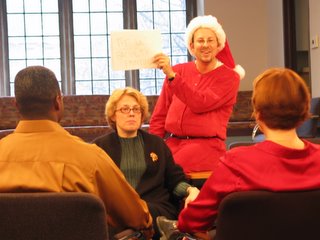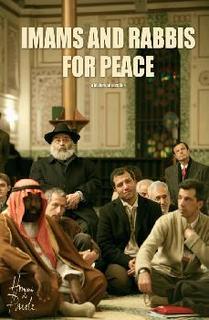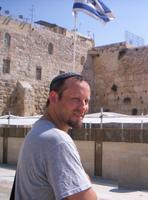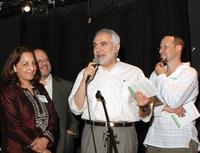
Delivered by Rabbi Daniel S. Brenner at Union Theological Seminary, Noon Chapel, October 20th, 2005.
The Zohar, the foremost book of Jewish mysticism, explains that the Sukkah generates such an intense concentration of spiritual energy, that the divine presence manifests itself in this fragile earthbound tent. During Sukkot we are told that the souls of the seven ancestral shepherds of Israel leave Gan Eden to partake in the divine light of the earthly festival (Zohar - Emor 103a). These transcendent guests are known as Ushpizin, the Aramaic word meaning "guests." And we welcome
Abraham who represents love and kindness
Isaac who represents restraint and personal strength
Jacob who represents beauty and truth
Moses who represents the power of Torah
Aaron who represents empathy and receptivity to divine splendor
Joseph who represents holiness and the spiritual foundation
David who represents the establishment of the kingdom of heaven on earth.
Some Sephardic Jews even have the custom of setting aside an ornately-decorated chair covered with fine cloth and holy books for these men, at a Jewish meal books belong on the table.
I should also note that since the 16th century women have also been invited for Ushpizin; According to the kabbalist Menachem Azariah, known as the Ramah of Fano, the seven female figures to be invited are: Sara, Miriam, Debora, Hanna, Abigail, Hulda and Esther.
For all of us Jews, Christians and Muslims who are spiritual descendents of Sarah, Hagar, and Abraham and those who came after them, Sukkot is a time to welcome in the spirit of these ancestors. And as a Jew, I have been taught to look on these seven shepherds not as simply spiritual forbearers – but as my actual ancestors.
But what do ancestors mean to us today?
I raise this question because I believe that there is a great tension in our progressive world between identity politics with its notion of honoring indigenous peoples – people connected to a place and a land, and on some deep level to the bones of their ancestors that lie under that land – and the ideas born from international socialism that to create peace the world most go beyond borders, nationalities, tribes, and ultimately ancestry.
Does it matter if you had ancestors in a certain place? Does it grant you any claim to that place? Is it blood that links you? Color? Genes? Why does that matter? Does anyone have claim to ancestral land? And conversely - Is the erasing of ancestry simply another way in which the homogenizing dominant powers lay claim to more territorial control?
Seventeen years ago, as an idealistic college student, I was arrested in Tonopah Nevada at a nuclear test site as part of a protest I engaged in with the chief of the Western Shoshone nation. After the arrest, I returned to the campsite where I was told that there would be two drumming circles –one for members of the tribe and one for ‘friends’ of the tribe. Since I come from a rather tribal people, this did not phase me – but my friend who I had traveled with was enraged – On a hike we took the next morning he said “I come all the way out here in the middle of the desert and I get myself arrested for them and now I’m told that I have to go play drums with the White people?” He was seriously pained. That night at dinner, he approached one of the tribal elders with his broken spirit. The elder told of the trail of tears and of the chain of tradition that was passed down to him from his grandfather – and he said that on this weekend he was now passing it down to his son. My friend, and I, understood.
Another experience:
A gay couple in our community is adopting a girl from a Chinese orphanage– it was a very complicated adoption -now they want to include her in the family, to raise her as a Jewish girl and send her to Hebrew School and teach her the aleph bet. During Shabbat services we call them up to the Torah and they weep openly when she is given her Hebrew name. Her blood and ancestry have been put aside to become a daughter of Israel – and we welcome a new family member in the midst.
There is a place in my heart for both stories. Stories in which one is faithful to ancestors and stories in which someone’s ancestry is altered by the love ties of a new family.
In Judaism, much remains tribal – and I felt very much like the Shoshone chief when I circumcised my sons. But the Talmud counters with numerous examples that teach that the relationship between student and teacher is more important than son and father. And later on traditions of conversion broke down the old categories of Jew and Gentile. In the end, love, and the expansion of the family, counters blood ties.
Maybe I’m wrong, but from my outsiders perspective it seems that Christianity has a similar tension. On the one hand, the Christian scriptures go to great length to trace Jesus’ ancestry – to trace him in the line that extends back to David, our last Ushpizin guest. And yet at times Jesus himself taught that ancestry was irrelevant – Jew or Greek – he saw all people as born of Adam and Eve – a deeply humanist teaching.
I am one of those people who is very wary of saying that we live in an unprecedented time – the Torah has it right - there is nothing new under the sun – but we do live in the first era of human existence when the biological child of one couple can be birthed into the world by any woman on the planet capable of childbearing. In the last decade, scientific advancements have trumped the ancestral cycle. And at the same time, science is making clear that genetic history – inheriting our ancestors genes – makes a huge contribution to our levels of depression, susceptibility to addiction and disease, and general abilities. Ancestry matters and does not matter more than it ever did.
So is there room for ushpizin - this ritual of recalling biblical ancestors? Or must it be discarded as too exclusivist and tribal or be universalized beyond the Abraham and Sarahs to include all peoples?
Allow me one excursion into theory – One way out of questions of blood and history is by saying that both collective narratives - tribal and universal - are impossible. There is no one definitive story of Morningside Heights, there are stories of Morningside Heights. There is no white people or black people or even man or woman. Post-Modernity privileges the personal and the biographical and relegates the tribal, universal and gendered to constructs – they are reduced to semiotic metaphors or reflections of the inner psyche.
In ancient times, the exact opposite was true – when we were in need of healing, we called on the merit of an ancestor who bravely faced illness to heal us – when we were powerless, we recalled their triumphs, when we were downtrodden, we remembered their joy. Our lives were simply one generation in a great chain that stretched back to the beginning of the tribe.
As moderns, we begin our adult lives by breaking away from ancestors – critiquing the patriarchy, distancing ourselves from mistakes made by earlier generations – we are to be self-made and self-reliant. And while there is much healing in the freedom that we have been granted with individualization, there is a loss – an empty space where ancestors once spoke to us – and urged us to be righteous, patient, brave.
When I became a parent seven years ago, and I bought life insurance - I began to think that some day, God-willing, I will inevitably be an ancestor. And it crossed my mind that I wanted my sons and daughter to tell the story of my particular family– to say that their ancestors were exiled from the Holy Land, fled to Iraq, to Spain, to Holland, and to Poland, to New York City, and to wherever it is that I’ll rest my bones. And even though I want them to reject the negative traits they inherit, I want them to be able to call on the merit of their great grandmother, and be sustained by her inner strength to overcome poverty and disease. I want them to know her story about getting a college scholarship but not being able to afford the bus fare to school. I want them to feel a sense of obligation to their ancestors.
For me, welcoming Biblical ancestors into the sukkah this week is a way to acknowledge the chain that I have descended from and to draw on the spiritual qualities they possessed. It is a way to say that I am not self-made – but rather a product of many generations who have asked me to carry on their story. Yet like the sukkahs open walls and roof, I am reminded that there is permeability even in connections to ancestry.
And so I end with a story.
Rabbi Pinchas of Koretz loved books – he read everything available and at a young age was considered a great master. After he got married, people began to stop by his tiny shack and interrupt his Torah study with questions – a line formed out his door. He was overwhelmed – how could he turn them away? Yet they were ruining his spiritual life. He turned to his wife who gave him raw onions to eat. But the people did not care – they wanted answers. Then he turned to God –and he said “Please – I do not want people to be attracted to me!” The next day he walked in the streets to the market and everyone averted their eyes. Noone came to his door. He could not have been happier – he studied til late in the night.
Months passed, and soon it was sukkot. Pinchas did not have the tools to build a sukkah. He had to send his wife to borrow some- and she returned and they built a modest hut.
They began their ushpizin and Abraham appeared at the tent’s opening. “Come in!” Rabbi Pinchas motioned to the spirit. Abraham did not come in. “Please, come in!’ he said. Abraham did not budge. “What is it?” Pinchas says. “There are no guests at this table. How can the spirit of loving-kindness enter into such a sukkah?”
Pinchas was distraught. He called out to God to erase his former request and he ran to the market to ask if any of the beggars needed a meal.
The story’s parable is compelling –
There can be no encounter with ancestors unless there is a genuine attitude in this life that welcomes in those who are our neighbors – even those who annoy us. The merit of the ancestors only comes when we enact the principle of hospitality and openness in our lives here and now.
Let this sukkah be a symbol for our hearts this season, open to the sky, and open to the stranger who might walk through the door. May we rush to provide an empty seat for the ushpizin.














